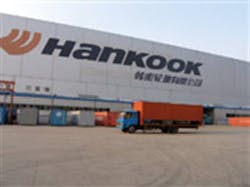Co-dependent growth: Production hikes in China and Korea will lift Hankook’s North American business
What Hankook Tire Co. Ltd. does in South Korea and China over the next couple of years will influence the company’s growth in North America.
Hankook is boosting manufacturing capacity at factories in both countries in order to ensure more tires reach the United States and Canada.
During a recent meeting at Hankook global headquarters in Seoul, South Korea, Hankook CEO and President Seung Hwa Suh said production increases are necessary because his company is selling every tire it produces.
Hankook is investing $225 million in its Geumsan, South Korea, plant in order to boost the passenger/light truck tire factory’s annual output by five million units. It currently builds 15.5 million tires per year.
Hankook also plans to increase manufacturing capacity at its Jiaxing, China, plant. Hankook’s Jiaxing and Jiangsu, China, plants can crank out 24.1 million tires annually at full capacity. The tiremaker’s plant in Daejon, South Korea, has a yearly capacity of 23.5 million units. Its fifth plant -- a new facility in Hungary -- began production six months ago.
“We are studying various parts of the world for our next production base,” said Suh when asked if Hankook has plans to build tires in the U.S.
[PAGEBREAK]
U.S. objectives
North America is Hankook’s second largest export market behind Europe. (Nearly 70% of Hankook’s total revenue comes from overseas sales.) Doing well in the U.S. and Canada is critical to the company’s overall health, according to Suh. “If you are successful in the U.S., you can be successful anywhere in the world.”
Hankook’s sales in the U.S. totaled $613 million in 2006. “We are developing our dealers at the retail level rather than the wholesale level,” said Suh. “In America, if you have 10 big dealers, if one stops buying from you, you’ll lose 10% of your business. Every customer is important.”
Between 2005 and 2006, the Hankook brand boosted its share of the U.S. replacement passenger tire market from 2.5% to 4%. During the same time, Hankook’s share of the American replacement light truck tire market rose from 1.5% to 2.5%. However, Hankook’s share of the U.S. medium/heavy truck tire market stayed the same at 2.5%.
During the meeting, Suh acknowledged that Hankook’s medium truck tire business has been harder to develop. “The truck tire business is a B-to-B business. I’m not saying we’re not reaching a certain level… but as a smaller manufacturer, we have a disadvantage when competing with larger companies. Once you sell truck tires, you need the proper network to look after them.”
Global target: number five
Suh said that Hankook is on an upward trajectory. During 2006, the company became the eighth largest tiremaker in the world with sales of $3 billion, passing up Cooper Tire & Rubber Co., Kumho Tire Co. Inc., Toyo Tire & Rubber Co. Ltd. and others.
By contrast, in 2001 Hankook was the 10th largest tire manufacturer in the world with $1.1 billion in sales.
Suh believes that obtaining the number five spot “isn’t an impossible target.” However, he said Hankook has a long way to go when it comes to brand awareness. “In terms of recognition, I’m never satisfied. Sales are one thing, but building the brand is what will establish our strong position.
“Quality is the basis of our business,” he continued. “If you fail to produce quality, your marketing activities mean nothing.”
